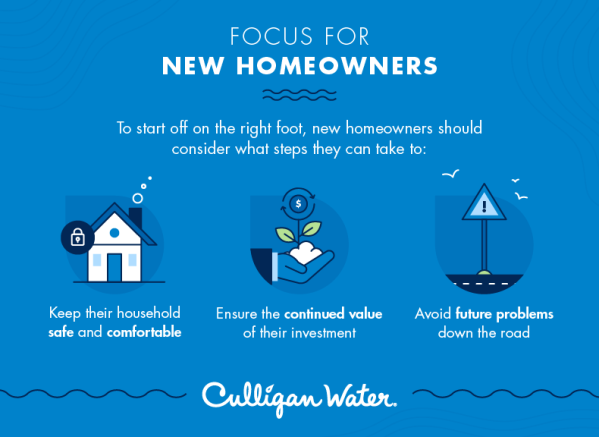For many people, homeownership is an important life goal. If you were renting previously, homeownership allows you the chance to start building equity instead.
Real estate can also be a lucrative investment, especially if you’re committed to improving the property. At the same time, homeowners enjoy greater flexibility about decision-making. Instead of seeking approval for even minor upgrades, you’re the ultimate authority on renovations and alterations.
That said, new homeowners also have to face a variety of issues they probably weren’t concerned about before. Now, you’ll have to work proactively to manage potential problems that could affect your well-being and the quality of life for your family. Additionally, some of these challenges could end up being quite expensive if not addressed early.
Here’s an overview of six common concerns faced by new homeowners. Even long-time homeowners could benefit from the reminders here, especially if you’re about to purchase a new residence.
1. Handling Hard Water
 One of the most common issues that arise for new homeowners is dealing with hard water in your home.
One of the most common issues that arise for new homeowners is dealing with hard water in your home.
Hard water is caused by high concentrations of minerals like calcium and magnesium in your household water. It can be especially prevalent for well water users, but even homes with municipal water could experience hardness. Without effective water softening in place, hard water can lead to plumbing corrosion as well as a decrease in the efficiency and life span of water-using appliances.
Other typical issues hard water causes include:
- Mineral and limescale buildup in pipes and on faucets and showerheads
- Streaks and spots on dishes
- Soap scum left on bathroom and kitchen surfaces
- Dry skin and dull hair after showering
- Faded or dull laundry following washing
Homeowners with hard water not only feel and see the unpleasant effects of this problem, but hardness can also add up to big expenses if you have to spend more on cleaning supplies and soaps, replace appliances early or conduct costly household repairs. Fortunately, home water softeners can help alleviate this problem.
2. Adjusting to Life With Property Taxes
First-time homeowners have to deal directly with a financial reality that’s new to them: property taxes. While footing the bill can seem daunting at first, there may be incentives you can leverage.
As personal financial advice publisher Kiplinger explains, there are many different tax breaks that may be available for new homeowners and buyers. Based on your circumstances, potential savings can come from:
- Deducting state and local property taxes when filing federal returns
- Calculating a deduction based on expenses for a home office
- Using credits for making medically necessary or energy-saving home improvements
Consult with a tax professional to find out what makes sense for you.
3. Finding the Best Insurance for Your Home
A recent U.S. News & World Report article explored some of the mistakes to avoid when buying a policy. Speaking with Rutgers University Law School professor Jay Feinman, the author discussed the importance of focusing on more than just premium payments. “Two-thirds of American homes are significantly underinsured,” Feinman says in the article.
To make sure you have a sufficient homeowners policy at a decent price, shop around. Know exactly what you’re getting for your money.
4. Paying for Expensive, Surprise Problems
As a new homeowner, for better or worse, there’s no more calling your landlord to fix household problems or appliance issues that suddenly emerge. Also, many routine expenses won’t be covered by your insurance policy, no matter how good it is.
It can be difficult enough to scrape together the money needed for a down payment, but without an adequate emergency fund too, you could be setting yourself up for financial headaches down the road.
Prepare for the unexpected, and take proactive steps to avoid making expensive repairs until they’re essential. For instance, as mentioned previously, a water softener can help you prolong the lifespan of water-using appliances, fixtures and more. Cleaning out your gutters regularly is also a good step toward preventing water damage in your home.
5. Improving the Taste and Quality of Your Water
Beyond hard-water issues, new homeowners may also have to take steps to ensure they have cleaner, safer drinking water available. The Water Quality Association notes that perceptible issues associated with water quality may include the taste or smell of:
- Rotten eggs or sulfur, potentially indicating the presence of hydrogen sulfide
- Musty odors, potentially indicating the presence of dissolved solids
- Something metallic, potentially indicating the presence of mercury, lead, copper, iron, manganese or zinc
It’s important to note that some common contaminants cannot be perceived by the senses, which is why it’s important to ensure that your water is tested, especially as a new homeowner.* Once you’ve identified any issues, home reverse osmosis systems can help you address possible water quality issues.
6. Keeping Track of Repairs, Renovations and Maintenance
New homeowners are often excited about the potential return on their investment. To realize the best outcome, though, it’s important to meticulously document all renovations, upgrades and routine maintenance conducted on the property.
In the future, these records will help you establish the value of your home for potential buyers. It can also reassure new residents that you’ve done your job caring for the home throughout your occupancy. Plus, you can use this information to help you stay ahead of home improvement projects instead of taking action only after you realize there’s a problem.
Enjoy Your New Home to the Fullest
While homeownership presents some new challenges, it’s definitely worth the effort. With a little bit of perseverance and some careful attention to your new residence, you can head off problems before they grow, helping you enhance the value and quality of your home for years to come.
*Contaminants may not necessarily be present in your water.




